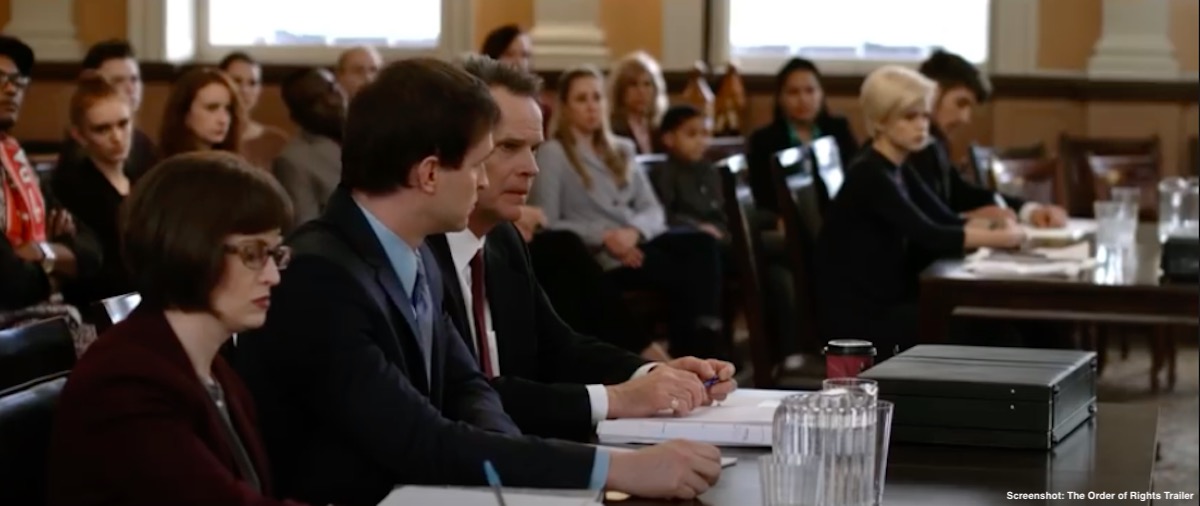“The Order of Rights,” a new pro-life film released on October 2, comes at a time when our country is considering once again just how important the issue of abortion is to our national conscience. The film offers a look into how answering that question might play out in real people’s lives.
Warning: Contains spoilers.
Viewers are quickly introduced to Emma, played by actress Emma Elle Roberts (“Unplanned”). Eighteen-year-old Emma is a drama geek with an independent streak. Her love interest is Ethan, a star on the football team and the son of a Christian pastor. An unlikely pair who initially bond over her trigonometry homework, their mutual attraction quickly blossoms into something more. One night, when Emma’s mother is gone, Ethan stays over… and four weeks later, Emma is devastated at a positive pregnancy test result.
The film follows Emma and Ethan as they explore the emotionally charged arena of legal rights when it comes to the most vulnerable among us: preborn human beings.
“The Order of Rights” brings forward the logic of the pro-life position, and simultaneously recognizes the difficulty of compassionately addressing such an intimately personal issue in the volatile public square. Pro-life viewers watching the film will likely be affirmed in the truth of their logic and encouraged to engage compassionately with pro-choice friends and relatives. Pro-choice viewers will likely be affirmed in their compassion for the mother, and encouraged to consider how to support both mother and child.
In a microcosmic reflection of our current culture, Emma and Ethan’s parents react in polar opposite ways to the news that they have a grandchild on the way. Emma’s mother urges abortion, while Ethan’s parents share that they deeply regret the abortion of their own “unplanned” baby, conceived when they were teens. As is the case for so many abortion-minded women and girls, support for continuing the pregnancy is sorely lacking among Emma’s sphere of influence.
She is repeatedly encouraged to think only of herself and the quickest way out of her “situation.” At the abortion provider’s office, Emma’s mother urges her to accept the offer of an abortion that same day, but Emma is hesitant, insisting that she wants to talk to Ethan. The abortion provider gently says, “I don’t think you should be punished with a baby right now. You’re so young, and this is a really difficult decision.” Emma’s friend later tells her, “Don’t let [Ethan] tell you what to do. This is your decision.”
When Ethan mentions getting married and parenting or adoption, Emma becomes defensive and angry, mirroring the attitudes of those closest to her who view their baby as a threat. When she says that there’s “another choice,” Ethan is horrified, saying, “We can’t kill our baby, Em.”
She shoots back, “It’s not even a baby yet, Ethan. It’s my body, and you said that you were going to support me.”
When he says he supports her but cannot condone murder, she retorts angrily, “Oh, so now you’re calling me a murderer? It’s my body, not yours! Don’t you tell me what I can and can’t do with my body!”
READ: ‘Bodily autonomy’ doesn’t mean women get to violently kill other humans
One off-putting moment of the film comes during Ethan’s conversation with a pro-life lawyer who offers to file a lawsuit on both Ethan and the baby’s behalf. Concerned about how Emma will be impacted, Ethan responds, “This is going to really upset Emma.” The lawyer’s response, while technically factual, comes across as formal and unfeeling.
“I’m sure it will,” he says, “but the big question is, how important is the life of your child to you?”
Tacitly, this answer seems to play into the pro-choice stereotype of pro-lifers as only caring about the child at the expense of the mother. The film could have taken an approach that prioritized both mother and child, using different language. Throughout the film, Ethan clearly still cares for Emma as a person and as the mother of his child. The lawyer’s attitude, though, could leave a bad taste in pro-lifer’s mouths.
The court case centers around one main argument. As the film’s title indicates and as Ethan’s lawyer states, “there’s an order to the rights” as written in the United States Constitution: life is the first right, followed by rights to liberty and the pursuit of happiness. The court proceedings engage common pro-choice and pro-life arguments about fetal pain, when human life begins, human viability, sentience, bodily autonomy, women’s rights, and more.
While “Order of Rights” was clearly marketed as a pro-life film, and certainly operates from that point of view, the pro-choice side is represented respectfully and compellingly.
Emma herself is portrayed compassionately as a complex character throughout the film. Far from being cast as a cold-hearted “murderer,” she is by turns distraught, confused, and afraid. When asked in the courtroom if she “wants to keep this pregnancy or not,” she doesn’t answer the question directly, saying instead, “I can’t keep this baby. I don’t see a choice.”
In speaking those words, Emma represents not only herself, a fictional character, but millions of women who have felt that, for one reason or another, they didn’t have a choice. Simultaneously, that same question represents an idea embedded in the pro-choice perspective: that the value of preborn life comes down to wantedness. Wanted children are precious in the pro-choice worldview, and worth celebrating, whereas unwanted children are ‘burdens’ and ‘blobs of tissue’.
One of the most powerful moments in the film is actually wordless, as Emma comes to terms with her own motherhood during an art fair at her mother’s studio. Both the ultimate outcome of the court case and Emma’s own decision about what to do are perhaps different than viewers might expect.
The film can be streamed online. See viewing options here.
“Like” Live Action News on Facebook for more pro-life news and commentary!







